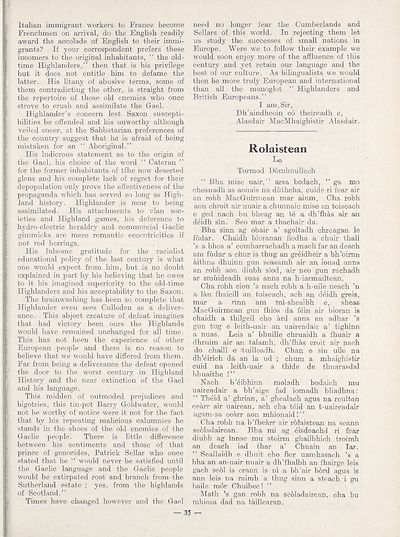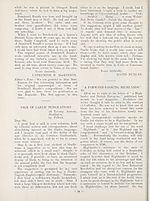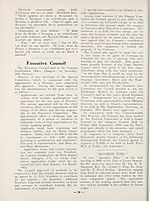An Comunn Gàidhealach Publications > Gaidheal > Volumes 58--62(part), January, 1963--March 1967
(451) Page 35
Download files
Complete book:
Individual page:
Thumbnail gallery: Grid view | List view

Italian immigrant workers to France become
Frenchmen on arrival, do the English readily
award the accolade of English to their immi¬
grants? If your correspondent prefers these
incomers to the original inhabitants, “ the old-
time Highlanders,” then that is his privilege
but it does not entitle him to defame the
latter. His litany of abusive terms, some of
them contradicting the other, is straight from
the, repertoire of those old enemies who once
strove to crush and assimilate the Gael.
Highlander’s concern lest Saxon suscepti¬
bilities be offended and his unworthy although
veiled sneer, at the Sabbatarian preferences of
the country suggest that he is afraid of being
mistaken for an ‘‘ Aboriginal.”
His ludicrous statement as to the origin of
the Gael, his choice of the word ‘‘ Cater an ”
for the former inhabitants of tfhe now deserted
glens and his complete lack of regret for their
depopulation only prove the effectiveness of the
propaganda which has served so long as High¬
land history. Highlander ,is near to being
assimilated. His attachments to clan soc¬
ieties and Highland games, his deference to
hydro-electric heraldry and commercial Gaelic
gimmicks are mere romantic eccentricities if
not red herrings.
His fulsome gratitude for the racialist
educational policy of the last century is what
one would expect from him, but is no doubt
explained in part by his believing that he owes
to it his imagined superiority to the old-time
Highlanders and his acceptability to the Saxon.
The brainwashing has been so complete that
Highlander even sees Culloden as a deliver¬
ance. This abject creature of defeat imagines
that had victory been ours the Highlands
would have remained unchanged for all time.
This has not been the experience of other
European people and there is no reason to
believe that we would have differed from them.
Far from being a deliverance the defeat opened
the door to the worst century in Highland
History and the near extinqtion of the Gael
and his language.
This midden of outmoded prejudices and
bigotries, this tin-pot Barry Goldwater, would
not be worthy of notice were it not for the fact
that by his repeating malicious calumnies he
stands in the shoes of the old enemies of the
Gaelic people. There is little difference
between his sentiments and those of that
prince of genocides, Patrick Sellar who once
stated that he “ would never be satisfied until
the Gaelic language and the Gaelic people
would be extirpated root and branch from the
Sutherland estate ; yes, from the highlands
of Scotland.”
Times have changed however and the Gael
need no longer fear the Cumberlands and
Sellars of this world. In rejecting them let
us study the successes of small nations in
Europe. Were we to follow their example we
would soon enjoy more of the affluence of this
century and yet retain our language and the
best of our culture. As bilingualists we would
then be more truly European and international
than all the monoglot ‘‘ Highlanders and
British Europeans.”
I am, Sir,
Dh’aindheoin c6 theireadh e,
Alasdair MacMhaighistir Alasdair.
Rolaistean
Le
Tormod Domhnullach
” Bha mise uair, ” arsa bodach, ” ga mo
ehosnadh as aonais na dixthcha, cuide ri fear air
an robh MacGuirmean mar ainm. Cha robh
aon chroit air nuair a chunnaic mise an toiseach
e ged nach bu, bheag an td a dh’fhks air an
d^idh sin. Seo mar a thachair da.
Bha sinn ag obair a’ sgoltadh chreagan le
fudar. Chaidh bioranan fiodha a chuir thall
’s a bhos a’ comharrachadh a mach far an deach
am fudar a chur is thug an gr&dheir a bh ’oimn
ifithne dhuinn gun seasamh air an, ionad anns
an robh aon diubh siod, air neo gun rachadh
ar smuideadh suas anns na h-iarmailtean.
Cha robh cion ’s nach robh a h-uile neach ’n
a lan fhaicill an toiseach, ach an deidh greis,
mar a rinn am ml-shealbh e, sheas
MacGuirmean gun fhios da f^in air bioran is
chaidh a thilgeil cho hrd anns an adhar ’s
gun tug e leith-uair an uaireadair a’ tighinn
a nuas. Leis a’ bhuille chruaidh a fhuair a
dhruim air an talamh, dh’fhas croit air nach
do chaiill -e (tujilleadh. Chan e sin uile na
dh’&rich da an la ud ; chum a mhaighistir
cuid na leith-uair a thlde de thuarasdal
bhuaithe !”
Nach b’&bhinn moladh bqdaich mu
uaireadair a bh’aige fad iomadh bliadhna:
” Theid a’ ghrian, a’ ghealach agus na reultan
cearr air uairean, ach cha t^id an t-uaireadair
agam-sa oearr aon mhionaid! ’ ’
Cha robh na b’fhehrr air rblaistean na seann
sebladairean. Bha mi ag ^isdeachd ri fear
diubh ag Innse mu stoirm ghailbhich troimh
an deach iad thar a’ Chuain an lar.
Seallaidh e dhuit cho flor uamhasach ’s a
bha an an-uair nuair a dh’fhalbh an fhairge leis
gach se61 is crann is nl a bh’air b6rd agus is
ann leis na raimh a thug sinn a steach i gu
bade m6r Chuibec! ”
Math ’s gan robh na sebladairean, cha bu
mhiosa dad na tkillearan.
Frenchmen on arrival, do the English readily
award the accolade of English to their immi¬
grants? If your correspondent prefers these
incomers to the original inhabitants, “ the old-
time Highlanders,” then that is his privilege
but it does not entitle him to defame the
latter. His litany of abusive terms, some of
them contradicting the other, is straight from
the, repertoire of those old enemies who once
strove to crush and assimilate the Gael.
Highlander’s concern lest Saxon suscepti¬
bilities be offended and his unworthy although
veiled sneer, at the Sabbatarian preferences of
the country suggest that he is afraid of being
mistaken for an ‘‘ Aboriginal.”
His ludicrous statement as to the origin of
the Gael, his choice of the word ‘‘ Cater an ”
for the former inhabitants of tfhe now deserted
glens and his complete lack of regret for their
depopulation only prove the effectiveness of the
propaganda which has served so long as High¬
land history. Highlander ,is near to being
assimilated. His attachments to clan soc¬
ieties and Highland games, his deference to
hydro-electric heraldry and commercial Gaelic
gimmicks are mere romantic eccentricities if
not red herrings.
His fulsome gratitude for the racialist
educational policy of the last century is what
one would expect from him, but is no doubt
explained in part by his believing that he owes
to it his imagined superiority to the old-time
Highlanders and his acceptability to the Saxon.
The brainwashing has been so complete that
Highlander even sees Culloden as a deliver¬
ance. This abject creature of defeat imagines
that had victory been ours the Highlands
would have remained unchanged for all time.
This has not been the experience of other
European people and there is no reason to
believe that we would have differed from them.
Far from being a deliverance the defeat opened
the door to the worst century in Highland
History and the near extinqtion of the Gael
and his language.
This midden of outmoded prejudices and
bigotries, this tin-pot Barry Goldwater, would
not be worthy of notice were it not for the fact
that by his repeating malicious calumnies he
stands in the shoes of the old enemies of the
Gaelic people. There is little difference
between his sentiments and those of that
prince of genocides, Patrick Sellar who once
stated that he “ would never be satisfied until
the Gaelic language and the Gaelic people
would be extirpated root and branch from the
Sutherland estate ; yes, from the highlands
of Scotland.”
Times have changed however and the Gael
need no longer fear the Cumberlands and
Sellars of this world. In rejecting them let
us study the successes of small nations in
Europe. Were we to follow their example we
would soon enjoy more of the affluence of this
century and yet retain our language and the
best of our culture. As bilingualists we would
then be more truly European and international
than all the monoglot ‘‘ Highlanders and
British Europeans.”
I am, Sir,
Dh’aindheoin c6 theireadh e,
Alasdair MacMhaighistir Alasdair.
Rolaistean
Le
Tormod Domhnullach
” Bha mise uair, ” arsa bodach, ” ga mo
ehosnadh as aonais na dixthcha, cuide ri fear air
an robh MacGuirmean mar ainm. Cha robh
aon chroit air nuair a chunnaic mise an toiseach
e ged nach bu, bheag an td a dh’fhks air an
d^idh sin. Seo mar a thachair da.
Bha sinn ag obair a’ sgoltadh chreagan le
fudar. Chaidh bioranan fiodha a chuir thall
’s a bhos a’ comharrachadh a mach far an deach
am fudar a chur is thug an gr&dheir a bh ’oimn
ifithne dhuinn gun seasamh air an, ionad anns
an robh aon diubh siod, air neo gun rachadh
ar smuideadh suas anns na h-iarmailtean.
Cha robh cion ’s nach robh a h-uile neach ’n
a lan fhaicill an toiseach, ach an deidh greis,
mar a rinn am ml-shealbh e, sheas
MacGuirmean gun fhios da f^in air bioran is
chaidh a thilgeil cho hrd anns an adhar ’s
gun tug e leith-uair an uaireadair a’ tighinn
a nuas. Leis a’ bhuille chruaidh a fhuair a
dhruim air an talamh, dh’fhas croit air nach
do chaiill -e (tujilleadh. Chan e sin uile na
dh’&rich da an la ud ; chum a mhaighistir
cuid na leith-uair a thlde de thuarasdal
bhuaithe !”
Nach b’&bhinn moladh bqdaich mu
uaireadair a bh’aige fad iomadh bliadhna:
” Theid a’ ghrian, a’ ghealach agus na reultan
cearr air uairean, ach cha t^id an t-uaireadair
agam-sa oearr aon mhionaid! ’ ’
Cha robh na b’fhehrr air rblaistean na seann
sebladairean. Bha mi ag ^isdeachd ri fear
diubh ag Innse mu stoirm ghailbhich troimh
an deach iad thar a’ Chuain an lar.
Seallaidh e dhuit cho flor uamhasach ’s a
bha an an-uair nuair a dh’fhalbh an fhairge leis
gach se61 is crann is nl a bh’air b6rd agus is
ann leis na raimh a thug sinn a steach i gu
bade m6r Chuibec! ”
Math ’s gan robh na sebladairean, cha bu
mhiosa dad na tkillearan.
Set display mode to:
![]() Universal Viewer |
Universal Viewer | ![]() Mirador |
Large image | Transcription
Mirador |
Large image | Transcription
| An Comunn Gàidhealach > An Comunn Gàidhealach Publications > Gaidheal > Volumes 58--62(part), January, 1963--March 1967 > (451) Page 35 |
|---|
| Permanent URL | https://digital.nls.uk/127154193 |
|---|
| Description | This contains items published by An Comunn, which are not specifically Mòd-related. It includes journals, annual reports and corporate documents, policy statements, educational resources and published plays and literature. It is arranged alphabetically by title. |
|---|
| Description | A collection of over 400 items published by An Comunn Gàidhealach, the organisation which promotes Gaelic language and culture and organises the Royal National Mòd. Dating from 1891 up to the present day, the collection includes journals and newspapers, annual reports, educational materials, national Mòd programmes, published Mòd literature and music. |
|---|---|
| Additional NLS resources: |
|

